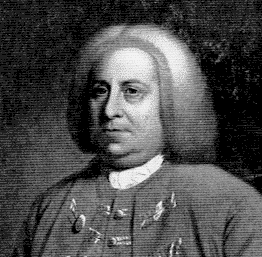 Lt. Governor Robert Dinwiddie Lt. Governor Robert DinwiddieRobert Dinwiddie was born of an old Scottish family. His father was a
prosperous merchant, and his mother also came from a commercial family. Robert was
educated at the University of Glasgow and entered his father's countinghouse. He later
carried on a successful carreer as a merchant..
Dinwiddie's role as a colonial administrator began in 1721,
when he was appointed British representative in Bermuda. After 16 years of service in
Bermuda, he received the important position of surveyor genal, which included jurisdiction
over Pennsylvania and the southern colonis of British North America. By tradition the
surveyor general was entitled to a seat on the Virginia Council, a post Dinwiddie insisted
on assuming. Characteristic of Dinwiddie's service in the Colonies was his zealous
attention to the offices under his authority and a tendency to maximize his position by
emphasizing the royal prerogative. In recognition of these qualities, he was appointed
lieutenant governor of Virginia, England's largest colony, and took office on July 4,
1751.
As lieutenant governor, Dinwiddie saw the beginnings of the
conflict on Virginia's fronties that led to the French and Indian War. He was a firm
advocate of British expansion into the west. He sought the help of the Indians and the
other British colonies in the struggle against the French, pressed the legislature for
defense funds, and favored the use of regular armed forces in place of the less reliable
militia. Dinwiddie made George Washington a lieutenant colonel in 1754.
Generally, Dinwiddie was able to work in harmony with the
Virginia Legislature. He did, however, prompt a serious conflict with the House of Burgess
shortly after he took office. In hope of increasing the British King's revenues, Dinwiddie
tried to levy a fee for land patents, which would also require landholders to pay
quitrents to the Crown. This precipitated the famous "Pistole Fee" controversy,
in which the lower house charged that the governor had imposed an unlawful tax that
endangered colonial liberty-a precursor of the arguements of the American Revolution.
The pressures of office and the war badly taxed Dinwiddie's
health. At his own request he was relieved of office in 1758, and with his wife and two
daughter's returned to Britain. He died in London on July 27, 1770. |

